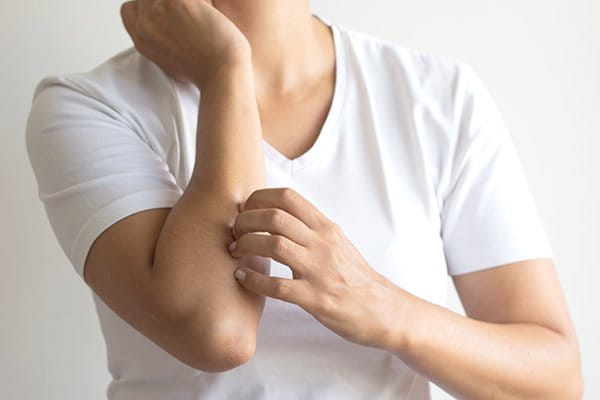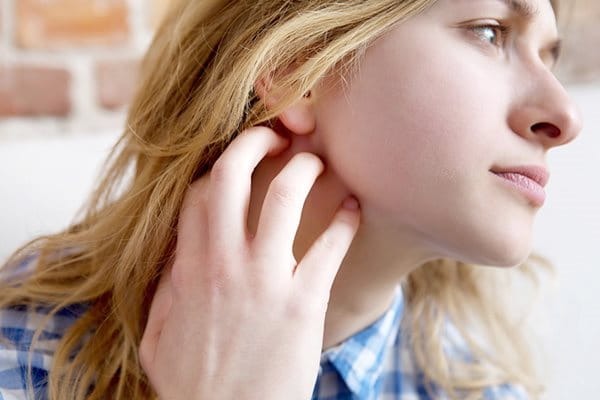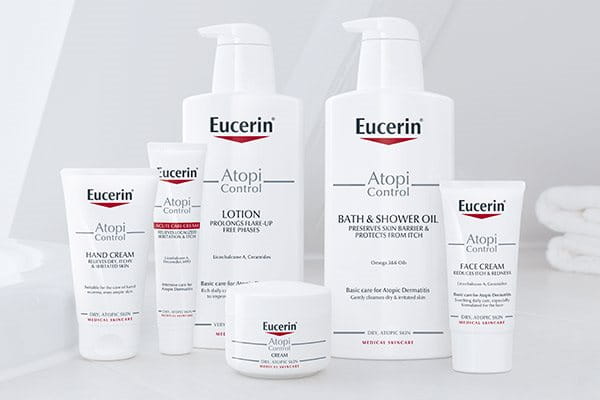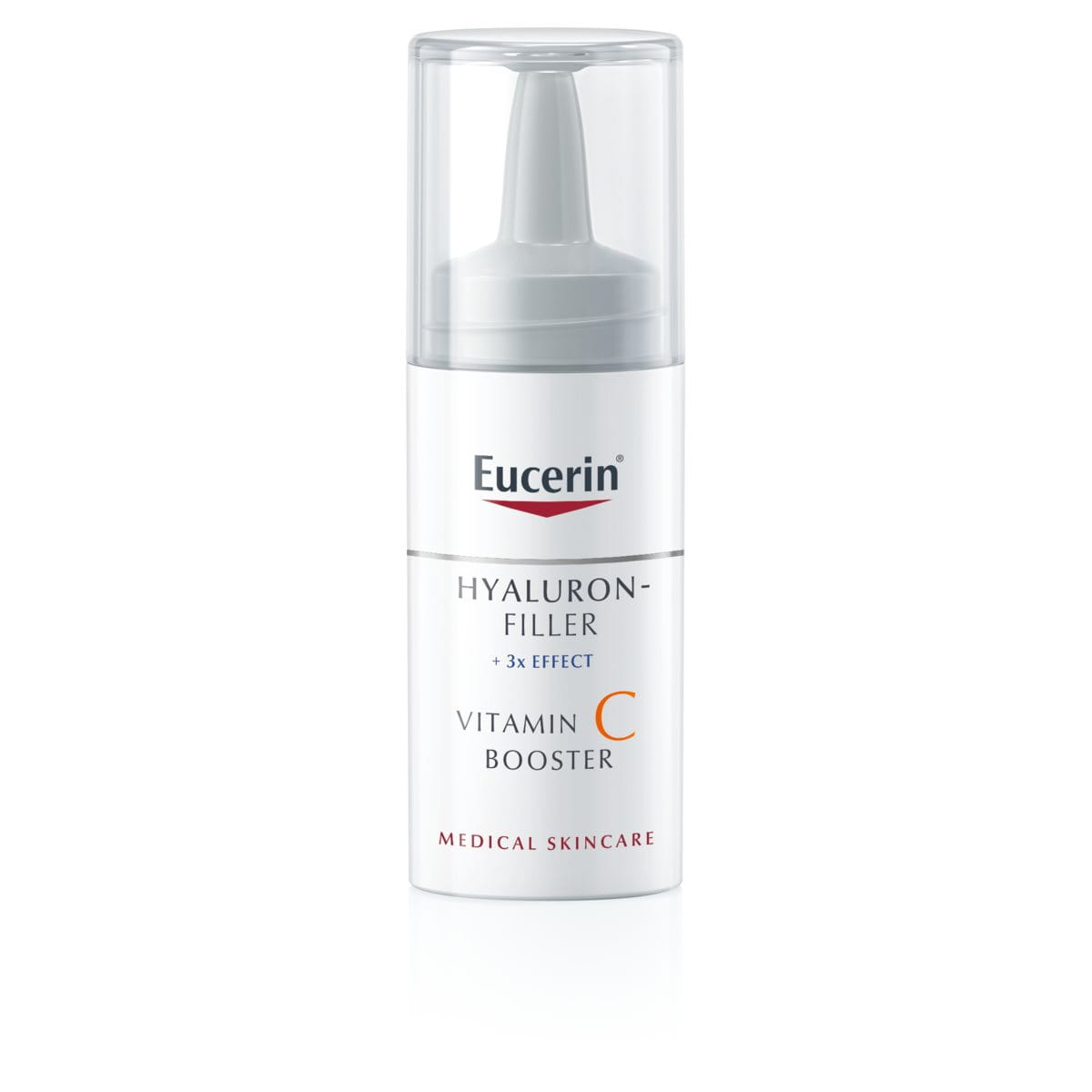Although often described as a childhood disease, one in twelve adults1 also suffers from Atopic Dermatitis. Some will have symptoms that linger on from childhood but others may experience it for the first time. This article looks at the symptoms, causes and triggers and makes suggestions about how best to care for adult atopic skin.
What causes adult Atopic Dermatitis?
Most children grow out of Atopic Dermatitis by the time they reach puberty but, for some, the symptoms persist. Recent research suggests that if you had persistent, late-onset or severe Atopic Dermatitis as a child then symptoms are more likely to persist into adulthood 2.
There are also a number of genetic and environmental factors that make some people more likely to experience Atopic Dermatitis than others whatever their age. You can read more about these possible causes in Understanding Atopic Dermatitis and find out about how the disease effects babies and children in Atopic Dermatitis and babies and Atopic Dermatitis and children.
How does Atopic Dermatitis effect adults?


Dry, itchy and irritable skin are all symptoms of Atopic Dermatitis. The disease is typified by two phases: the acute, flare-up phase and the period between when skin is calmer and less reactive. You can read more about these phases in Understanding Atopic Dermatitis and Identifying and managing flare-ups. In fair-skinned people atopic skin is normally reddish and may turn brown. In darker skins, the affected area can become lighter or darker as Atopic Dermatitis affects pigmentation.
Affected areas differ according to age. In adults, symptoms most commonly appear on the face (including the delicate eye area), scalp, elbow folds, knee cavities, hands and feet. You can find out more about Atopic Dermatitis in each of these areas in Facial Atopic Dermatitis, Atopic Dermatitis on the eyelids, Atopic Dermatitis on the head/scalp, Atopic Dermatitis on the hands and Atopic Dermatitis on different parts of the body.
Dry, itchy skin is uncomfortable to live with and can have a considerable impact on quality of life. The constant scratching can cause problems in the workplace and can lead to sleepless nights3 . Read more in How Atopic Dermatitis affects sleep and quality of life.
What triggers a flare-up and how can I avoid them?
There are a number of external influences that can trigger a flare-up of Atopic Dermatitis and lots of things you can do to try and reduce the amount your skin flares-up. Read more about them in Understanding Atopic Dermatitis.
The following potential triggers are more commonly associated with adults than babies or children:

Reaction to chemicals in the workplace
Adults with underlying Atopic Dermatitis are more likely to develop Contact Dermatitis in the workplace. Contact Dermatitis occurs when skin is either irritated by, or allergic to natural and synthetic chemicals used in the workplace. These can include: aggressive soaps, perfumes, dyes and solvents. You can find out more about Contact Dermatitis in Atopic Dermatitis on the hands. Try to limit exposure (e.g. by wearing gloves) and be sure to thoroughly cleanse and moisturise skin regularly and after exposure to trigger irritants.
Sweat
Exercise is great for mind and body but quick changes in temperature combined with the salts in sweat can cause skin to dry out and trigger inflammation. Try to take regular breaks to cools down, drink lots of water and wear gentle, natural and breathable fabrics.
Cigarette smoke
Give up or, at least, reduce the amount you smoke to reduce the chance of the smoke triggering your atopic skin.
Which skincare products will calm and comfort my atopic skin?
Gentle but thorough cleansing and effective moisturisation will help to give your skin the daily care it needs and prolong the period between flare-ups:
How do I choose a daily cleanser?

Look out for one that has been tested on, and proven to be effective with, atopic skin. And try to avoid products that contain fragrance and colourants. We recommend Eucerin AtopiControl Bath and Shower Oil for your body and Eucerin UltraSENSITIVE Cleansing Lotion for your face.
Avoid water that is too hot (it can dry skin out) and take quick showers rather than long baths. Pat rather than rub skin dry and apply moisturiser immediately afterwards.
How do I choose a daily moisturiser?

Look out for products that contain proven actives such as:
- Licochalcone A: an extract of liquorice to soothe skin and reduce redness
- Ceramides: to strengthen the skin’s barrier
- Natural oils rich in Omega fatty acids to sooth, nourish and protect skin
These ingredients are at the heart of the formula in the Eucerin AtopiControl range. Eucerin AtopiControl Lotion is easy to apply all over the body, Eucerin AtopiControl Cream is ideal for particular problem areas such as the elbow folds and knee cavities. For Atopic Dermatitis on the hands we recommend Eucerin AtopiControl Hand Cream and for your face try Eucerin AtopiControl Face Cream.
How do I soothe and calm my skin during a flare-up?

If you suffer from Atopic Dermatitis, consult your doctor. They may recommend:
- a steroid, such as Hydrocortisone 1% Cream
- a more potent cream or ointment
- bandages and wet wraps
- phototherapy (ultraviolet light treatment to reduce inflammation)
- oral corticosteroids and, sometimes, antibiotics, to prevent skin from becoming infected
- antihistamines to reduce severe itching
A non-medical product such as Eucerin AtopiControl Acute Care Cream can be used alongside a medical product to soothe skin during a flare-up. In addition to Licochalcone A, the Acute Care Cream contains cooling Menthoxypropandiol and anti-bacterial Decanediol. Apply your topical medical product first and allow it to absorb before applying Eucerin AtopiControl Acute Care Cream to the area of skin that is flaring up. You should then follow with the appropriate Eucerin Care product such as Eucerin AtopiControl Lotion for your body.
Find out more in Identifying and managing flare-ups and how to care for adult atopic skin.
Sources
- WebMD
- Persistence of atopic dermatitis (AD): A systematic review and meta-analysis. Kim JP, Chao LX, Simpson EL, Silverberg JI. J Am Acad Dermatol. 2016 Oct; 75(4):681-687.e11.Epub 2016 Aug 17.
- Atopic dermatitis from adolescence to adulthood in the TOACS cohort: prevalence, persistence and comorbidities .Mortz CG, Andersen KE, Dellgren C, Barington T, Bindslev-Jensen C. Allergy. 2015 Jul; 7097):836-45. Epub 2015 Apr 16.
Our brand values

We deliver a holistic dermo-cosmetic approach to protect your skin, keep it healthy and radiant.

For over 100 years, we have dedicated ourselves to researching and innovating in the field of skin science. We believe in creating active ingredients and soothing formulas with high tolerability that work to help you live your life better each day.

We work together with leading dermatologist and pharmacist partners around the world to create innovative and effective skincare products they can trust and recommend.








